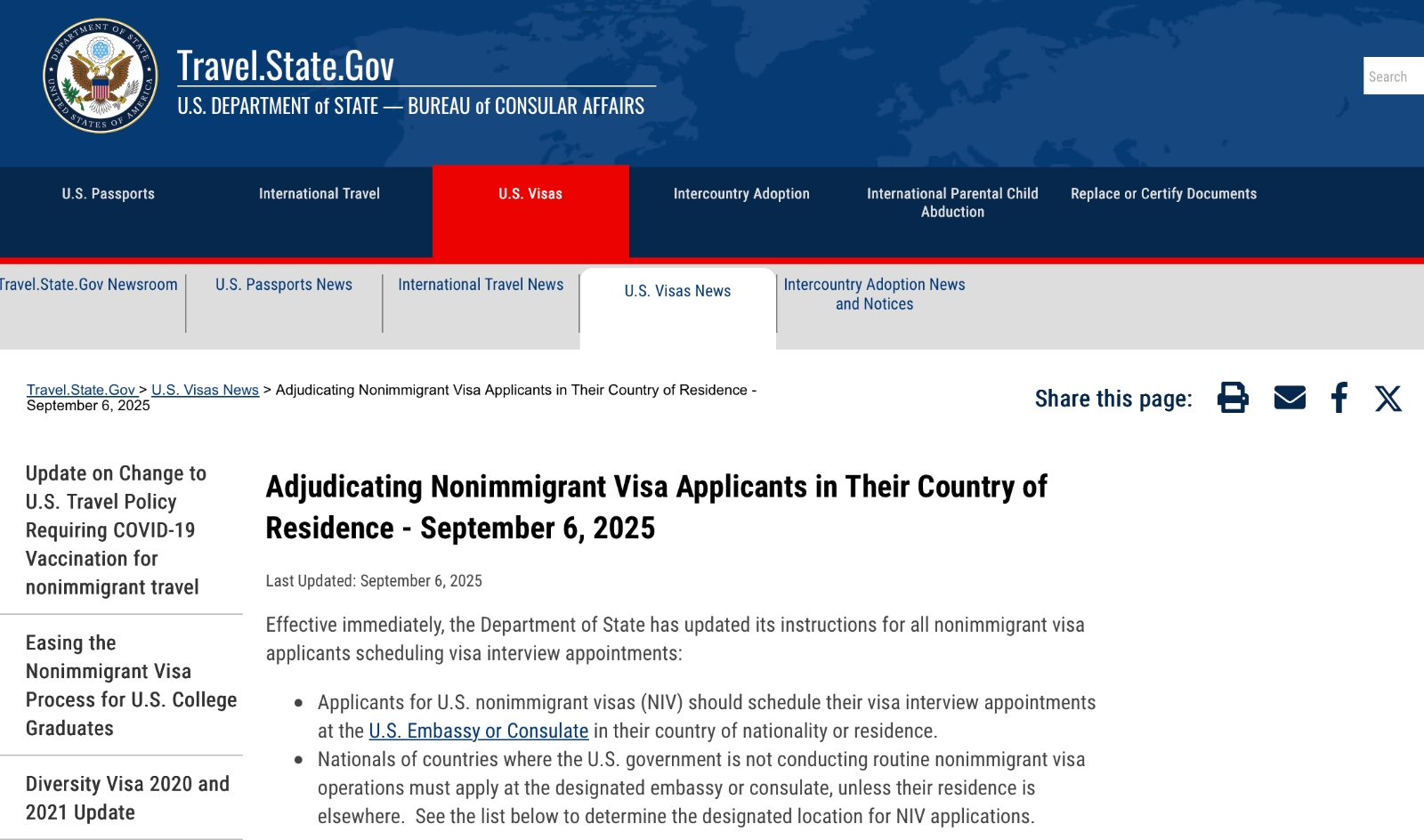Attention Immigrants! The U.S. Completely Cancels 'Third Country Visa Interviews'
On September 6 local time, the U.S. Department of State officially announced: Effective immediately, all non-immigrant visa applicants must complete interviews at U.S. embassies or consulates in their home country or country of long-term residence. The introduction of this regulation means that the previously widely used “third-country visa interview” channel is completely closed.

1. Core policy changes: Must apply in home or residence country, fees non-refundable
• Must apply in nationality or residence country: According to the latest guidelines issued by the U.S. Department of State, effective immediately, all non-immigrant visa applicants (including common categories such as B1/B2, F1, H1B, L1, etc.) must submit applications at embassies or consulates in their nationality or legally long-term residence country. If applying based on the “residence country”, sufficient proof such as long-term visas, work, or study documents must be provided.
• Fees non-refundable: If applicants choose the wrong application location and have already paid, the fee will neither be refunded nor transferred to another embassy or consulate.
• Appointment availability: Regarding interview appointment availability, the Department of State clearly states that waiting times vary by location, and applicants applying outside their nationality or residence country will face longer appointment waiting times.
• Existing appointments: For non-immigrant visa applicants who have successfully made appointments, the U.S. Department of State states that existing appointments are generally not canceled, and applicants can still proceed to the scheduled embassy or consulate for interviews as planned.
2. Limited exceptions, only a few categories exempt
New regulations do not apply to A, G, C-2, C-3, NATO visa applicants, diplomatic or official visa applicants, and visa applicants related to the United Nations Headquarters Agreement. Additionally, only a very few humanitarian reasons, medical emergencies, or special applications based on U.S. national interests may receive exceptional treatment.
Notably, since September 2, almost all non-immigrant visa categories have canceled the interview waiver policy, and applicants must personally go to embassies or consulates for interviews. This series of changes almost completely ends the previous flexibility of “third-country visa interviews”.
3. Profound impact on international students and foreign employees in the U.S.
This policy adjustment has a particularly significant impact on the group of international students in the U.S. Previously, many students would choose to go to Canada or Mexico for visa renewals during holidays, usually completed within a few days, but now they must return to their home country to apply, significantly increasing time and cost.
For foreign employees in the U.S. holding work visas such as H, L, O, they also need to return home for renewals, which will bring new uncertainties to employers' staffing arrangements. Family visit visa applicants will also be affected, as parents or elderly who previously relied on visa-free fast approvals will now need to queue for interview appointments, significantly extending waiting times.
4. Chinese applicants must return home to submit applications, no alternative arrangements
For Chinese applicants, since multiple U.S. consulates are already set up domestically, they must return home to submit visa applications, with no alternative arrangements. For applicants from countries without U.S. visa services, the Department of State has announced alternative processing locations: Russian applicants must go to Astana, Kazakhstan or Warsaw, Poland; Iranian applicants must go to Dubai; Venezuelan applicants are designated to apply in Bogotá.
5. EB-5 investment immigration not affected, reserved visas still advantageous
It is worth noting that this policy adjustment only targets non-immigrant visas, and EB-5 investment immigration as an immigration category is not affected. Especially under the new law, reserved visa categories such as rural projects still maintain no backlog status, providing applicants with the opportunity for “dual submission”, meaning applicants can simultaneously submit I-526E and I-485 applications, and receive a Combo card in about 3 months, allowing legal stay, study, and work in the U.S. while waiting for a green card.
Overall, the U.S. Department of State's adjustment of non-immigrant visa policies brings many inconveniences and challenges to many people worldwide who wish to go to the U.S. In this context, for families hoping to develop long-term in the U.S., planning their status in advance and fully utilizing stable immigration channels such as EB-5 investment immigration may be a wise choice to cope with future uncertainties.